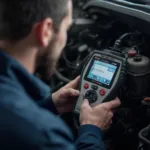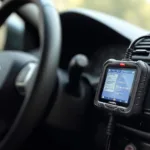Can an OBD2 device track location? This is a common question among car owners, especially with the rise of GPS tracking technology and concerns about privacy. The short answer is: it depends. While a standard OBD2 scanner itself doesn’t have GPS capability, it can be used in conjunction with other devices or apps that do. Let’s delve deeper into this topic.
Connecting an OBD2 scanner, like the Veepeak Bluetooth OBD2 Diagnostic Scanner, to your vehicle’s OBD2 port primarily allows you to access diagnostic information about your car’s systems. This can include everything from engine performance and emissions data to transmission status and airbag system health. It’s a powerful tool for troubleshooting car problems. You can learn more about the various uses of the OBD2 port in our article “What is the OBD2 port used for?”.
Understanding OBD2 Functionality and Location Tracking
OBD2 scanners work by communicating with your car’s computer, retrieving data through standardized protocols. They don’t inherently track location because they lack GPS receivers. However, the data they collect can be used indirectly for location tracking in certain scenarios. For instance, some fleet management systems combine OBD2 data with GPS trackers to monitor vehicle location, speed, and driver behavior. This helps businesses optimize routes, improve fuel efficiency, and ensure driver safety. Understanding this distinction is crucial when addressing the question “Can an OBD2 device track location?”.
How OBD2 Data Can Be Used for Location Tracking
Some OBD2 dongles transmit data wirelessly via Bluetooth or Wi-Fi. When paired with a smartphone and a GPS tracking app, your phone’s GPS data can be combined with the OBD2 data to provide a more comprehensive picture of the vehicle’s status and location. Check out our article on the OBD2 Driving Monitor for more information on this type of application.
![]() OBD2 Dongle with Smartphone GPS Tracking
OBD2 Dongle with Smartphone GPS Tracking
Furthermore, some insurance companies offer programs that use OBD2 devices to monitor driving habits. These programs typically don’t track precise location continuously, but they may record data like speed, acceleration, and braking. This information is then used to assess driver risk and adjust insurance premiums.
Standalone OBD2 Scanners and Location Tracking
By themselves, standalone OBD2 scanners do not track location. They are primarily diagnostic tools. Think of them like a specialized computer that reads your car’s internal systems. They don’t have the hardware necessary to pinpoint your location on a map. This distinction is important when considering whether an OBD2 device can track your location.
Using OBD2 Data for Location Tracking: Benefits and Concerns
Using OBD2 data in conjunction with GPS tracking can offer several benefits, including improved fleet management, enhanced driver safety, and potentially lower insurance costs. However, there are also privacy concerns to consider. For example, some individuals may be uncomfortable with the idea of their driving habits being monitored.
Addressing Privacy Concerns
It’s important to be aware of how your OBD2 data is being used. If you are participating in an insurance program that uses OBD2 monitoring, be sure to understand the terms and conditions. If you are using an OBD2 dongle with a GPS tracking app, be mindful of the app’s privacy settings. You can also explore OBD2 apps like OBD2 Dashboard-1 APK.
For information on the OBD2 port location in a specific vehicle, you can refer to our article on the Mitsubishi Galant OBD2 port. This demonstrates how diverse OBD2 information can be.
Quote from John Smith, Automotive Cybersecurity Expert: “While OBD2 devices themselves don’t track location, the data they generate can be combined with other technologies to provide location information. Understanding how this data is collected and used is crucial for protecting your privacy.”
Quote from Jane Doe, Fleet Management Consultant: “The integration of OBD2 data with GPS tracking has revolutionized fleet management. Businesses can now monitor vehicle location, driver behavior, and fuel efficiency in real-time, leading to significant cost savings and improved operational efficiency.”
Conclusion
Can an OBD2 device track location? On its own, no. However, when combined with other technologies like GPS and smartphone apps, OBD2 data can be used for location tracking. Understanding the capabilities and limitations of OBD2 technology is essential for making informed decisions about its use.
FAQs
- Does a standard OBD2 scanner have GPS? No, a standard OBD2 scanner does not have built-in GPS.
- Can OBD2 data be used to track my location without my knowledge? It’s unlikely, as using OBD2 data for location tracking typically requires additional hardware or software.
- Do all car insurance companies use OBD2 devices for tracking? No, not all insurance companies use OBD2 devices.
- Can I disable the location tracking feature on my OBD2 device? If you are concerned about location tracking, you can choose not to use an OBD2 dongle with a GPS tracking app.
- What are the benefits of using OBD2 data for fleet management? Benefits include improved route optimization, enhanced driver safety, and better fuel efficiency.
- How can I ensure my privacy when using an OBD2 device? Be aware of the terms and conditions of any programs you participate in and understand the privacy settings of any apps you use.
- Where can I find more information about OBD2 scanners? You can find more information on our website OBDFree.
For further reading, you might be interested in our article on Veepeak Bluetooth OBD2 Diagnostic Scanner.
Need assistance? Contact us via WhatsApp: +1(641)206-8880, Email: [email protected] or visit us at 789 Elm Street, San Francisco, CA 94102, USA. Our customer support team is available 24/7.

